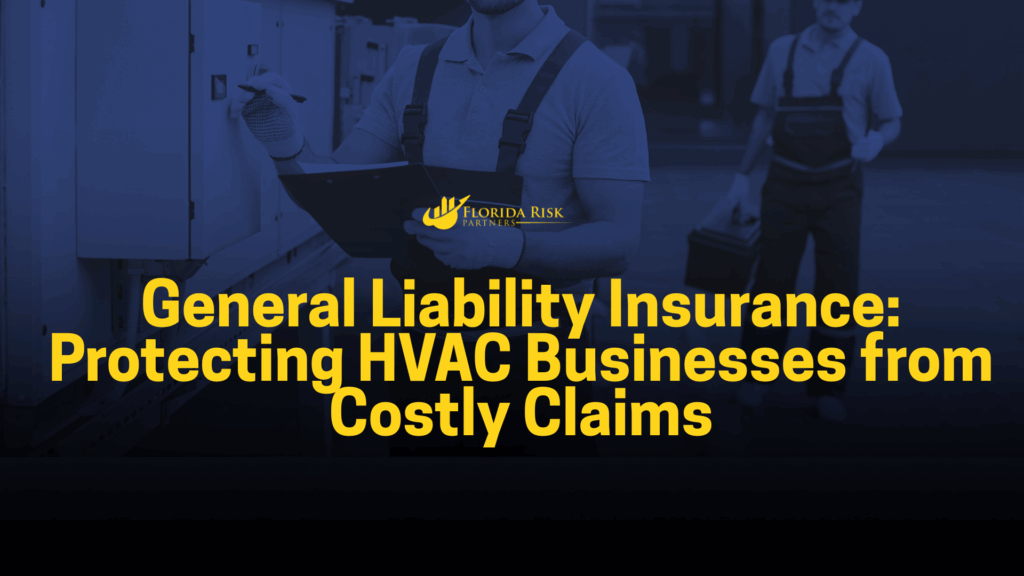-
Main Office: 1434 E. Bloomingdale Ave Valrico, FL 33596-6110
-
Phone: (888) 601-6660
-
Email: info@floridariskpartners.com

In the HVAC business, things don’t always go according to plan. A technician accidentally damages a customer’s ceiling. A client slips on a wet floor near your worksite. A refrigerant leak triggers property damage in a commercial building. These types of situations aren’t just inconveniences—they’re potential lawsuits, and without the right insurance, they can devastate your business.
That’s why general liability insurance is a foundational part of any HVAC company’s risk management strategy. For Florida contractors, where high humidity, hurricane threats, and rapid growth in residential and commercial development increase risk exposure, this coverage isn’t just smart—it’s essential.
In this post, we’ll break down what general liability insurance is, why it matters to HVAC contractors in Florida, the kinds of claims it covers, and what limits you should consider to protect your business.
What Is General Liability Insurance?
General liability insurance is designed to protect your HVAC business from third-party claims involving:
- Bodily injury (e.g., someone gets hurt because of your work)
- Property damage (e.g., you damage a client’s property while installing or repairing equipment)
- Personal or advertising injury (e.g., slander, libel, or copyright infringement)
This coverage helps pay for legal defense, settlements, and judgments if your business is found responsible for the damage. It also helps cover medical expenses in the event of injury.
In short, it’s the insurance policy that protects your business from many of the day-to-day risks that come with working in homes, commercial buildings, and construction zones.
Why Florida HVAC Contractors Need General Liability Insurance
If you’re running an HVAC business in Florida, general liability isn’t just helpful—it’s a non-negotiable part of staying protected and competitive. Here’s why:
1. You’re Constantly Working on Someone Else’s Property
HVAC work is invasive by nature. You’re installing, replacing, or repairing complex systems inside walls, ceilings, and rooftops. One wrong move, and you could:
- Puncture a pipe
- Crack a tile
- Damage expensive drywall
- Start an electrical fire
Even something as minor as tracking mud into a customer’s home could lead to a claim. And with Florida’s higher-than-average rate of legal action in the construction industry, you’re at increased risk of being sued.
2. Florida Weather Creates Riskier Job Conditions

Humidity, storms, and sudden downpours mean you’re often working in wet or slick conditions. Customers or third parties may be on-site and could easily slip, fall, or be injured near your workspace. General liability insurance ensures your business is covered when accidents happen.
3. Licensing Requirements Demand It
As we covered in last week’s blog, the Florida Department of Business & Professional Regulation requires HVAC contractors to carry:
- $100,000 in bodily injury liability
- $25,000 in property damage
- Or a combined single limit of $300,000
These are the legal minimums. In reality, most HVAC contractors should carry higher limits based on the size of their business, the types of properties they work on, and the potential size of claims.
What General Liability Insurance Covers for HVAC Contractors
Here’s a breakdown of the most common types of claims general liability insurance covers—and how it works in real-life HVAC scenarios.
Bodily Injury to a Third Party
Example: A customer trips over one of your refrigerant hoses while walking through their garage and breaks their wrist. Your general liability policy pays for their medical bills and any legal claims they bring against your business.
Property Damage Caused by Your Work
Example: While removing an old air handler, one of your technicians accidentally drops it through a ceiling tile, damaging the client’s home theater system below. General liability covers the repairs and any additional losses.
Completed Operations Coverage
Example: You finish installing a mini-split system in a condo, but a week later, a refrigerant line bursts due to improper installation, causing water damage to the floor. If the damage occurs after your work is completed, general liability still provides protection.
Legal Defense Costs
Even if a claim is false, your HVAC company still needs to defend itself. General liability insurance typically covers:
- Attorney’s fees
- Court costs
- Settlements or judgments
Given Florida’s legal climate, this aspect of the policy is just as valuable as the coverage limits themselves.
What General Liability Insurance Does Not Cover
While general liability offers broad protection, it doesn’t cover everything. It’s important to understand what’s excluded, so you can fill those gaps with the right supplemental policies.
Employee Injuries
Injuries to your employees are not covered by general liability. You need a separate workers’ compensation policy for that.
Damage to Your Own Property
If your tools or equipment are damaged or stolen, general liability won’t help. That’s where inland marine insurance comes in.
Professional Errors or Faulty Design

If a client sues you because your HVAC design failed to meet performance expectations (but didn’t cause physical damage), that’s a professional liability (E&O) issue, not a general liability one.
Vehicle Accidents
For any incidents involving your work vans or trucks, you need commercial auto insurance—not general liability.
Real-Life HVAC Claim Examples in Florida
Here are a few actual scenarios that demonstrate how general liability insurance protects HVAC companies from costly financial fallout.
Claim 1: A Roof Leak in Palm Beach
A technician was working on a rooftop unit at a luxury beachfront condo. During removal, he accidentally damaged the roof membrane, which went unnoticed until a rainstorm caused major interior damage. The HOA sued the HVAC company for $85,000 in property repairs. General liability insurance paid for the settlement and legal costs.
Claim 2: Injured Homeowner in Tampa
A customer walked through an active jobsite in their attic while a technician was routing ductwork. They tripped over a cord and fell through the ceiling, fracturing their shoulder. The customer sued for pain and suffering. The HVAC contractor’s general liability policy covered the $60,000 payout.
Claim 3: Fire in a Miami Strip Mall
Faulty wiring during an HVAC install led to a small electrical fire in a tenant’s retail space. Though the fire was extinguished quickly, the business lost inventory due to smoke damage. General liability insurance covered the tenant’s loss and the legal defense for the HVAC company.
How Much General Liability Coverage Should You Carry?
Minimum coverage may get you licensed, but it may not protect your business when the real costs hit.
Here’s a general guideline:
- Small residential HVAC contractors: $500,000 to $1 million
- Mid-sized commercial contractors: $1 million per occurrence, $2 million aggregate
- Large firms or high-risk work (rooftop, hospitals, schools): Consider umbrella coverage to extend limits beyond $2 million
Also, many general contractors and municipalities require you to carry specific limits to qualify for bids. Don’t let insufficient insurance keep you from winning profitable contracts.
Choosing the Right Policy for Your Business
Not all general liability policies are created equal. Here’s what to look for when evaluating your options:
Occurrence vs. Claims-Made Coverage
- Occurrence-based policies cover claims from incidents that happened during the policy period, even if filed later.
- Claims-made policies only cover claims filed during the policy term.
Occurrence coverage is generally better for HVAC contractors due to delayed discovery of damage.
Additional Insured Endorsements
If you work as a subcontractor, your general contractor may require you to list them as an additional insured on your policy. Make sure your insurance provider can issue these quickly.
Policy Limits and Deductibles
Evaluate your exposure and balance your deductible with affordable premium costs. Higher deductibles reduce premium costs but increase your out-of-pocket risk.
Final Thoughts: Liability Coverage Is Your First Line of Defense
In the HVAC industry, mistakes can happen—even when you run a tight operation. General liability insurance helps you sleep at night knowing that if a claim arises, you won’t be paying out of pocket or risking your business.
For Florida HVAC contractors, where heat, humidity, hurricanes, and high expectations collide, protecting your business with the right general liability policy is the responsible—and necessary—move.
Let’s Review Your Liability Coverage Together
Not sure if your current general liability policy is enough to protect your HVAC business? We specialize in working with Florida HVAC companies and can quickly assess whether your coverage meets both legal requirements and real-world risks.
Call Us Or
Schedule an Appointment
Select an agent below to view our online calendars and select a day and time that works best for you or call us directly at 888-601-6660. When you use our online calendars, you will receive an email with more information.



